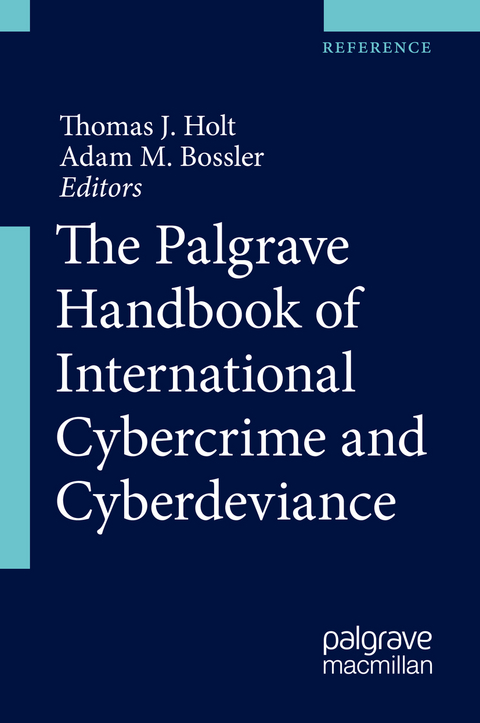
The Palgrave Handbook of International Cybercrime and Cyberdeviance
Springer International Publishing
9783319784397 (ISBN)
Thomas J. Holt is a professor in the School of Criminal Justice at Michigan State University, and his research focuses on cybercrime, cyberterrorism, and police responses to these phenomena. His work has been published in various peer reviewed journals including British Journal of Criminology, Crime and Delinquency, Deviant Behavior, and Terrorism and Political Violence. He has co-authored multiple books including Cybercrime and Digital Evidence: An Introduction, and Cybercrime in Progress: Theory and Prevention of Technology-Enabled Offenses. Dr. Holt is also a fellow at the Netherlands Institute for the Study of Crime and Law Enforcement, a founding member of the European Society of Criminology’s working group on cybercrime, and the director of the International Interdisciplinary Research Consortium on Cybercrime, a global association of scholars in the social and technical sciences whose research considers cybercrime and cybersecurity.Dr. Adam M. Bossler is Professor and Chair of the Department of Criminal Justice and Criminology at Georgia Southern University. He earned his doctorate in criminology and criminal justice from the University of Missouri – St. Louis. His research primarily focuses on examining the application of traditional criminological theories to various forms of cybercrime offending and victimization and the law enforcement response to cybercrime. His research has been funded by the National Science Foundation, Bureau of Justice Assistance, and the United Kingdom Home Office. He is a co-author of three books: Cybercrime and Digital Forensics: An Introduction, 2nd edition (Routledge); Cybercrime in Progress: Theory and Prevention of Technology-Enabled Offenses (Routledge) (winner of the 2017 Academy of Criminal Justice Sciences’ International Section Outstanding Book Award); and Policing Cybercrime and Cyberterror (Carolina Academic Press). Some of his recent peer-reviewed work can be found in Criminology and Public Policy, International Journal of Offender Therapy and Comparative Criminology, Policing, Journal of Crime & Justice, and Deviant Behavior. He teaches courses on hackers, malware, and economic crimes; cybercrimes against persons and society; cybercriminology; criminology; and policing. He is an active member of the American Society of Criminology's Division of Cybercrime, the International Interdisciplinary Research Consortium on Cybercrime (IIRCC), and the European Society of Criminology’s Working Group on Cybercrime.
Foundations of Technology Use/Abuse and the Criminal Justice System .- Defining cybercrime.- Historical evolutions of Cybercrime: From Computer Crime to Cybercrime.- Legislative frameworks in dealing with cybercrime.- The USA.- The UK.- The EU Convention on Cybercrime.- Asia.- Cybersecurity as an industry.- Technology use, abuse, and public perceptions of cybercrime.- Cyberwarfare and nation-state threats.- The interplay of police and extralegal organizations to combat cybecrime.- Forensic evidence and cybercrime.- Organized Crime and Cybercrime.- The Dark Web as a Platform For Crime.- Criminological Theory and Cybercrime .- Social Learning.- Subcultural Theory.- The General Theory of Crime.- General Strain Theory and Cybercrime.- Digital Drift.- Space Transition Theory.- Routine Activities.- Rational Choice.- Deterrence.- Psychological theories and cybercrime (Cyberpsychology).- Internet Addiction and Cybercrime.- Critical Theories and Cybercrime.- Cyber-Tresspass .- Computer Hacking and the Hacker Subculture.- Insider Threats, Outsiders, and Nation-States.- Global Voices in Hacking (Multi-national views).- Hactivism and Cause Based Hackers.- Malicious software threats.- Cybercrime as service operations.- Cyber-Deception and Theft .- Data Breaches and Carding.- Social Engineering.- Identity Theft and Identity Crimes: Global Perspectives.- Romance Scams.- Nigerian Email Schemes.- Phishing and Financial Manipulation.- Digital Piracy as a Social Problem.- Legal Responses to Piracy.- Counterfeiting Products Online.- Cyber-Porn/Obscenity .- Historical Challenges of Technology and Pornographic Content.- Sexual Subcultures and On-line Spaces.- Dating and sexual relationships in the age of the Internet.- Sexting and Social Concerns.- Zoophilia.- BDSM and the Internet Age.- Child Pornography and Child Sexual Exploitation Frameworks.- The Rise of Sex Trafficking On-Line.- Camming and Capping.- Cyber-Violence .- Cyberbulling.- Online Harassment.- Cyberstalking.- Intimate Partner Violence and the Internet: Perspectives.- Technological Facilitation of Gang Activity and Violence.- Hate Speech in Online Spaces.- The Role of Technology in Facilitating Terror and Extremism on and offline.- Suicidal Ideation and Online Platforms.- Cyberwarfare as realized conflict.- Theorizing The Future of Cybercrime .- Criminal Social Networks and the Internet.- Police Legitimacy in the Age of the Internet.- Transforming Punishment as a Function of Technology.- The Rise of Cyberwarriors in Nation-State Relationships.- The Future of Criminological Theory and Cybercrime.- Technological Adoption and Cybercrimes.
| Erscheint lt. Verlag | 6.6.2020 |
|---|---|
| Reihe/Serie | The Palgrave Handbook of International Cybercrime and Cyberdeviance |
| Zusatzinfo | XX, 1489 p. 56 illus., 46 illus. in color. In 2 volumes, not available separately. |
| Verlagsort | Cham |
| Sprache | englisch |
| Maße | 155 x 235 mm |
| Gewicht | 3065 g |
| Themenwelt | Recht / Steuern ► Strafrecht ► Besonderes Strafrecht |
| Recht / Steuern ► Strafrecht ► Kriminologie | |
| Schlagworte | Computer Science • crime and psychology • crime and technology • cyber attacks • Cyberbullying • cyber-porn • cybersecurity • Cyberterrorism • cyber-theft • cyber-trespass • Cyber-violence • dark Web • deviant behavior • Internet addiction • online victimisation • policing • Sex Trafficking • social media and crime • victims |
| ISBN-13 | 9783319784397 / 9783319784397 |
| Zustand | Neuware |
| Informationen gemäß Produktsicherheitsverordnung (GPSR) | |
| Haben Sie eine Frage zum Produkt? |
aus dem Bereich
